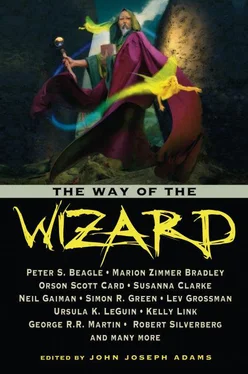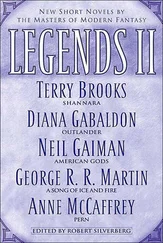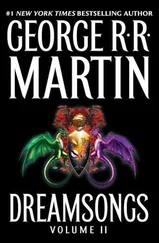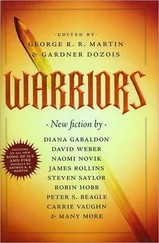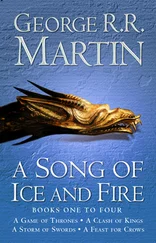Nothing lasts for eternity, I say.
Ideals do, he replies with conviction. There is Good and there is Evil, and those who believe in the Good must stand up and be counted.
Isn’t that what you have done, I ask.
Yes, says Arthur, but until now the choice was an easy one. Now I do not know which road to take. If I stop feigning ignorance, then I must kill Lancelot and burn the queen at the stake, and this will surely destroy the Round Table. He pauses and looks at me. Tell me the truth, Merlin, he says, would Lancelot be a better king than I? I must know, for if it will save the Round Table, I will step aside and he can have it all — the throne, the queen, Camelot. But I must be sure.
Who can say what the future holds, I reply.
You can, he says. At least, when I was a young man, you told me that you could.
Did I, I ask curiously. I must have been mistaken. The future is as unknowable as the past.
But everyone knows the past, he says. It is the future that men fear.
Men fear the unknown, wherever it may lie, I say.
I think that only cowards fear the unknown, says Arthur. When I was a young man and I was building the Table, I could not wait for the future to arrive. I used to awaken an hour before sunrise and lay there in my bed, trembling with excitement, eager to see what new triumphs each day would bring me. Suddenly he sighs and seems to age before my eyes. But I am not that man anymore, he continues after a thoughtful silence, and now I fear the future. I fear for Guenivere, and for Lancelot, and for the Round Table.
That is not what you fear, I say.
What do you mean, he asks.
You fear what all men fear, I say.
I do not understand you, says Arthur.
Yes, you do, I reply. And now you fear even to admit to your fears.
He takes a deep breath and stares unblinking into my eyes, for he is truly a brave and honorable man. All right, he says at last. I fear for me.
That is only natural, I say.
He shakes his head. It does not feel natural, Merlin, he says.
Oh, I say.
I have failed, Merlin, he continues. Everything is dissolving around me — the Round Table and the reasons for it. I have lived the best life I could, but evidently I did not live it well enough. Now all that is left to me is my death — he pauses uncomfortably — and I fear that I will die no better than I have lived.
My heart goes out to him, this young man that I do not know but will know someday, and I lay a reassuring hand on his shoulder.
I am a king, he continues, and if a king does nothing else, he must die well and nobly.
You will die well, my lord, I say.
Will I, he asks uncertainly. Will I die in battle, fighting for what I believe when all others have left my side — or will I die a feeble old man, drooling, incontinent, no longer even aware of my surroundings?
I decide to try once more to look into the future, to put his mind at ease. I close my eyes and I peer ahead, and I see not a mindless babbling old man, but a mindless mewling baby, and that baby is myself.
Arthur tries to look ahead to the future he fears, and I, traveling in the opposite direction, look ahead to the future I fear, and I realize that there is no difference, that this is the humiliating state in which man both enters and leaves the world, and that he had better learn to cherish the time in between, for it is all that he has.
I tell Arthur again that he shall die the death he wants, and finally he leaves, and I am alone with my thoughts. I hope I can face my fate with the same courage that Arthur will face his, but I doubt that I can, for Arthur can only guess at his while I can see mine with frightening clarity. I try to remember how Arthur’s life actually does end, but it is gone, dissipated in the mists of Time, and I realize that there are very few pieces of myself left to lose before I become that crying, mindless baby, a creature of nothing but appetites and fears. It is not the end that disturbs me, but the knowledge of the end, the terrible awareness of it happening to me while I watch helpless, almost an observer at the disintegration of whatever it is that has made me Merlin.
A young man walks by my door and waves to me. I cannot recall ever seeing him before.
Sir Pellinore stops to thank me. For what? I don’t remember.
It is almost dark. I am expecting someone, I think it is a woman, I can almost picture her face. I think I should tidy up the bedroom before she arrives, and I suddenly realize that I don’t remember where the bedroom is. I must write this down while I still possess the gift of literacy.
Everything is slipping away, drifting on the wind.
Please, somebody, help me.
I’m frightened.
Cinda Williams Chimais the best-selling author of the young adult fantasy series the Heir Chronicles , consisting of (so far) The Warrior Heir, The Wizard Heir, and The Dragon Heir . Two more books in the series are forthcoming. Meanwhile, Chima recently started publishing a new series (also young adult) — the Seven Realms quartet — which began with The Demon King in 2009 and was followed by The Exiled Queen earlier this year. Learn more at cindachima.com.
Lord Acton said, “Power corrupts, and absolute power corrupts absolutely,” and that certainly seems to be the case with a lot of wizards one could name. In J.R.R. Tolkien’s The Lord of the Rings , the Dark Lord Sauron creates an evil master ring in order to enslave the wearers of the other rings of power. In The Black Cauldron , the wicked Horned King uses the eponymous cookware to call forth an army of zombie slaves. And in the novel Azure Bonds by Jeff Grubb and Kate Novak, an amnesiac warrior awakens to discover that her arm has been tattooed with magical sigils, and when they glow, she falls under the mental domination of a cadre of sinister conspirators.
So why can’t wizards ever try to get what they want by just asking nicely? It’s always enslavement this and domination that. The heroine of our next piece also finds herself an unwilling pawn to a cruel wizard; those familiar with Chima’s Heir Chronicles series will recognize her as the enchantress Linda Downey. The story began life as a deleted scene from the second book in the trilogy, The Wizard Heir , which Chima says it broke her heart to cut. So when I contacted her about writing a story for the anthology, she reworked it into this fine standalone story.
The Trader and the Slave
Cinda Williams Chima
The house by the sea was always cold, and the light never more than tentative. The gloom held fast in the corners, by day or night, and sometimes Linda fancied that things crouched there, watching her. But there was never any need to conjure monsters beyond the ones she knew for real: There could be none more terrifying. After all, the imagination had its limits.
The broker, Garlock, was talking when Linda entered the hall, waving his arms expansively, pitching like a barker at a traveling show. It was meant to inspire condescension in his clients, to make them underestimate him.
The stranger was listening, head cocked a little to one side, one hand grasping his other forearm. This trader — another wizard, of course — was tall and lean, with large hands and unimportant clothes, and a face that hinted he had stories of his own. A ring set with a large stone glittered on his right hand. It seemed out of place, somehow, given the nondescript nature of the rest of his clothes. Was it a heartstone? Linda couldn’t tell.
As was usual with wizards, it was difficult to tell how old he was. He reminded her of a leopard, taut and high strung, not a bit of unnecessary flesh on him. A predator. His long coat had been soaked with rain on the long walk up from the drive, and now it steamed, as if he gave off heat. Or perhaps he had purposely smudged his appearance with a glamour.
Читать дальше
